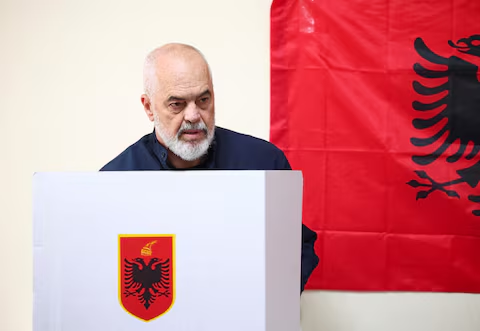Albanian Prime Minister Edi Rama appeared poised for a historic fourth term after preliminary results showed his Socialist Party heading toward a landslide victory in the country’s national election. With nearly all ballots counted, the ruling party secured more than 50% of the vote, positioning itself to govern without a coalition in the 140-seat parliament.
Rama, who has served as prime minister since 2013, hailed the early results as a mandate from the Albanian people to continue his leadership and policies. “The people of Albania have once again spoken clearly,” Rama said in a televised address on Tuesday. “This is not just a victory for our party, but a vote of confidence in stability, progress, and our European path.”
The Socialist Party’s projected win comes despite growing public frustration over economic stagnation, corruption, and slow progress toward European Union membership. But Rama’s campaign successfully emphasized continuity and stability, especially amid regional tensions and global uncertainty.
According to Albania’s Central Election Commission, voter turnout was approximately 42%, a significant drop compared to previous elections. Analysts suggest this decline may have reflected widespread political disillusionment or voter apathy, especially among younger citizens.
Meanwhile, the opposition Democratic Party, led by former Prime Minister Sali Berisha, was trailing with just over 34% of the vote. Berisha has rejected the early results and accused the ruling party of vote-buying, intimidation, and misuse of state resources. “This was not a free and fair election,” Berisha declared. “We are gathering evidence of widespread irregularities and will challenge these results through all legal means.”
This marks the latest chapter in Albania’s increasingly polarized political landscape. Berisha’s return to active politics, despite being sanctioned by the United States for corruption, was a controversial focal point during the campaign. His critics argue that his comeback threatens to erode democratic norms and undermine Albania’s aspirations for EU membership.
International observers, including the Organization for Security and Co-operation in Europe (OSCE), monitored the election and offered mixed assessments. While they acknowledged that the vote was generally calm and organized, they also noted concerns over pressure on public employees, media bias, and the use of state resources by incumbents.
A new factor in this election was the inclusion of Albania’s large diaspora vote. For the first time, over 200,000 Albanians living abroad were allowed to vote by mail. Some local observers claimed the diaspora’s participation may have affected results in key constituencies. Opposition parties have alleged irregularities in how these votes were counted, further escalating tensions.
Despite the controversy, Rama’s expected victory would make him the longest-serving prime minister in Albania’s post-communist history. His tenure has seen a mix of infrastructural development and reform promises, though critics argue progress has often been overshadowed by widespread graft and a lack of judicial independence.
Looking ahead, Rama has pledged to redouble efforts to advance EU accession talks, which have stalled in recent years. Brussels has criticized Albania for failing to implement key reforms in areas such as judicial independence, rule of law, and anti-corruption. Rama insists his government will move forward with these reforms, saying, “Albania’s place is in Europe, and we will make sure we get there.”
With the final official results expected in the coming days, Rama’s opponents have vowed to keep challenging what they describe as an illegitimate process. Yet for now, the Socialist Party looks set to maintain a firm grip on power — and Edi Rama stands on the verge of making political history.
Source: Reuters



